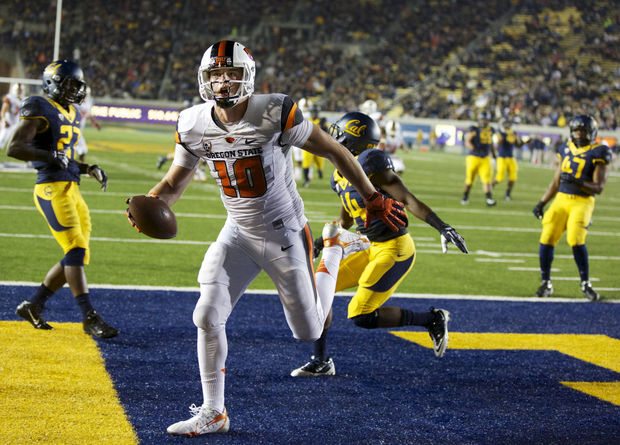Train your swing and trust it.
Darron Thomas is a wonderful, intuitive athlete, extraordinarily tough and competitive, but the teachings of Bob Rotella could give him an edge in the Cowboy Classic.
Bob Rotella is a speaker and sports psychologist from Charlottesville, Virginia. He teaches athletes how to choose to think for maximum performance, and he’s coached dozens of professional golfers, including Pat Bradley, Padraig Harrington, Tom Kite, Jim Furyk and Davis Love III, to millions of dollars in winnings. In all his clients have won over 25 major championships. According to his biography at the University of Virginia, Rotella “has worked as a consultant for personnel for the NBA, NFL, Major League Baseball, Nascar, PGA Tour, LPGA Tour, Senior Tour, U.S. Olympic Ski Team and the U.S. Olympic Equestrian Team.”
Rotella wrote one of the best-selling golf books of all time, Golf is Not a Game of Perfect, a slim, understandable, empowering, beautifully-written little book that offers simple, practical, time-tested principles that a competitor can use to perform better in any area of life, whether it’s golf, a sales presentation, a job interview or a history test. Or a nationally-televised football game between two of the top five teams in the country. As a speaker on motivation and goals he’s served as a consultant to many leading corporations, among them Merrill Lynch, General Electric, Ford, Time-Life, Coca Cola, Chrysler, Newsweek, Pepsi-Cola, Taco Bell and Pizza Hut.
The key is, Rotella doesn’t rely on psychological mumbo jumbo or mystical thinking. He doesn’t teach athletes what to think, just how to think in order foster a trusting, flowing state at game time, where the mind and body are in harmony, energy is focused, and the competitor can let himself perform his best.
Train your swing and trust it? Football and golf are different, but the idea is the same in either sport. For the next four weeks, DT is going to be in an intense preparation phase. Every day he’ll be thinking and working with his coaches on techniques, strategies, coverages, reads. He’ll be working on his arm angle and footwork, the read and the mesh, defensive tendencies and timing with his receivers. There will be two-a-days and seven-on-seven and film study and whiteboard sessions, scrimmages, practices, drills. He’ll be immersed and overloaded, and that’s exactly what should happen. In addition, he’ll be bombarded with media requests, and because the game is in his home state, friends and family will email and call wanting tickets or wanting to see him while he’s in Dallas. All while he tries to lead his team in an important game, with three new wide receivers and two new starting linemen. He’s the quarterback. And he wants to have the game of his life, playing against a legendary SEC opponent, a top five team in the nation, against the coach who didn’t think he was good enough to play quarterback. He wants to get the taste of the national championship loss out of his mouth, and have a better start than he did in Glendale.
That’s a lot going on at one time. No one works harder than Darron Thomas, and few players have a greater desire to improve. Here’s the Rotella part: as game time approaches, especially in the last few days of practice before the team leaves for Dallas, Darron has to get increasingly trusting and instinctive in running the offense. He has to go from preparation mode to playing mode, where he allows his body and the recognitions he’s carefully absorbed to take over. That way he’ll be completely in the flow of the game. He’s visualized every successful outcome so vividly that he will readily see plays develop before they happen. The noise, lights, and mayhem of the game will fade completely in the background. He’ll see targets. He’ll see the right decisions. He’ll be perfectly in rhythm and the right throws and moves will come easily to him, without thinking. When an athlete is in the deeply-focused, calm, meditative state, the game seems effortless and almost in slow motion. For anyone who has ever experienced this, whether skiing, playing basketball, painting or laying bricks, it is an exhilarating experience.
At the national championship game, Thomas played beautifully over the last three quarters. But he started amped and anxious, forcing his throws and tentative in his decisions. Once he found his rhythm he was the best quarterback on the field, throwing for 363 yards and two touchdowns. Darron had a marvelous season as a first-year starter for Oregon, but what few errors and problems he had in games often came early in the contest. In the Saturday night showdown with Stanford he had two costly turnovers in the first quarter. Starting better, and being in the focused performance mindset when the game begins, will allow him to play his best from the first possession. Best example in Duck annals? Dennis Dixon in his senior year, starting games with a wonderful quiet intensity, led a team that scored on first possessions in game after game.
Chip Kelly actually alluded to this principle in his ESPN interview with Chris Fowler yesterday during the PAC-12 East Coast Media Tour. He used different words, but the meaning is very Rotella-like:
“Darron, like every quarterback I’ve coached, I’ve got to tell them that, ‘You’ve got to let it happen, not make it happen,’ ” Kelly said. “When you try to force the game as a quarterback, then you end up hurting yourself. But he’s such a sharp kid. He does things every day that surprise you …
“His competitive nature, his toughness, I know we’re going to get his best game on the 3rd.”
Add The Sports Daily to your Google News Feed!
